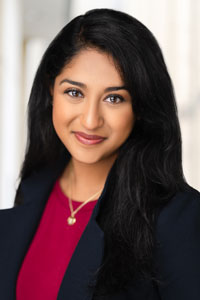Meet Keerthi S

Why did you become a healthcare consultant?
I’ve always had an interest in healthcare. Growing up I always assumed you had to be a nurse or a doctor, or have some type of clinical role, to have a career in healthcare. But as I went through college and graduate school, I was exposed to more of the business side of healthcare and realized the impact those functions have on care delivery. It made me realize that I could have a business career, yet still have an immense impact on patients and communities.
What do you like most about healthcare consulting?
I love that we get to work across departments and functions and interact with all levels of staff. At Hilsmier, we pride ourselves on being able to engage with not only the C-suite executives, but also the individuals working in operations roles who really have their ‘boots on the ground.’
From a day-to-day perspective, what is your favorite part about your role?
I love the creative side of what we do. I like when our Hilsmier team is brainstorming new ideas that could help solve one of our client’s challenges. We all have really different backgrounds and strengths, so it’s fun and interesting to hear everyone’s perspectives and ideas come together.
What are your hobbies outside of the office?
I’ve been in consulting for over five years, so have spent a lot of time on the road. It’s made me realize how much I love a good home cooked meal. As a result, I’ve developed a passion for cooking and baking when I’m home on the weekends. I love exploring Atlanta where I live with my husband and our beagle, Maverick, as well as catching up with friends and family. I also enjoy any dance-based workout classes as well as barre and yoga.
What is the best piece of professional advice you’ve ever received?
When I first started out in consulting, one of my managers told me that “Humans have two ears and one mouth, and they should be used in that ratio.”
What she meant is that you should be listening twice as much as you’re speaking. You should be observing clients for those non-verbal cues and paying attention to what they are not saying. Good consultants are able to pick up on those non-verbal cues and use them to help build trust and confidence with their clients.
